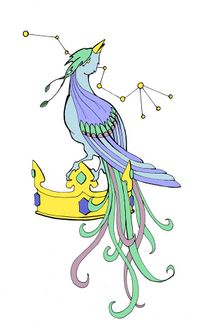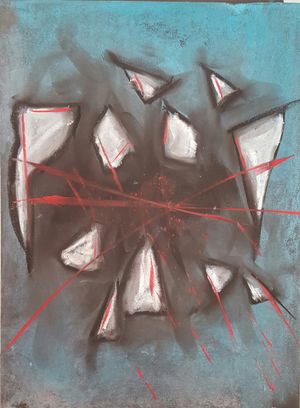The Crimson Feast
mNo edit summary |
|||
| Line 21: | Line 21: | ||
==Description== | ==Description== | ||
This enchantment lets a target shrug off the effects of sword-blows by evoking the [[Winter magic]] resonance of [[Winter_magic#Survival|survival]]. It draws on a formal agreement between mortal magicians and the [[eternal]] [[Agramant]]. It draws primarily on the Winter resonance of survival, but also touches on [[Winter_magic#Hunger|hunger]] and [[Winter_magic#Cruelty|cruelty]]. The magic is designed in such a way that it ''requires'' the flesh of a sapient being - most likely an orc or human in the Empire - be consumed as part of the casting. Many priests and magicians consider eating the flesh of a thinking being to be cannibalism, regardless of the species of the person doing the eating. It's often considered to be spiritually risky; there are plenty of stories of those who engage in unnecessary cannibalism becoming corrupt in body and soul. Several of | This enchantment lets a target shrug off the effects of sword-blows by evoking the [[Winter magic]] resonance of [[Winter_magic#Survival|survival]]. It draws on a formal agreement between mortal magicians and the [[eternal]] [[Agramant]]. It draws primarily on the Winter resonance of survival, but also touches on [[Winter_magic#Hunger|hunger]] and [[Winter_magic#Cruelty|cruelty]]. The magic is designed in such a way that it ''requires'' the flesh of a sapient being - most likely an orc or human in the Empire - be consumed as part of the casting. Many priests and magicians consider eating the flesh of a thinking being to be cannibalism, regardless of the species of the person doing the eating. It's often considered to be spiritually risky; there are plenty of stories of those who engage in unnecessary cannibalism becoming corrupt in body and soul. Several of Agramant's rituals and ceremonies encourage just such aberrant behaviour, and there are several legends that suggest people who willingly engage in cannibalism specifically to gain power become easy prey for the eternal's wiles. Many [[blood magic|blood magicians]] theorise that the consumption of flesh taken from an "unwilling" donor has the same unpredictable malevolent effects as using stolen blood in rituals. | ||
Anyone who participates in this ritual will find the meat they eat to be especially appetising and risk succumbing to the temptation to secure more. The longer the ritual lasts, the more tempting the idea of committing murder specifically to eat human or orc flesh becomes. | Anyone who participates in this ritual will find the meat they eat to be especially appetising and risk succumbing to the temptation to secure more. The longer the ritual lasts, the more tempting the idea of committing murder specifically to eat human or orc flesh becomes. | ||
Revision as of 09:16, 11 October 2024

While Agramant is subject to the enmity of the Imperial Conclave, it is illegal to perform this ritual.
Rules
Winter Magnitude 15
Urizen Lore
This ritual is part of Urizen lore rather than Imperial Lore. Any Urizen character with the appropriate lore can master or perform this ritual. A character from another nation who mastered the ritual before it became part of Urizen lore may still perform it, but does so under the usual rules for performing a ritual learned from a ritual text.
Performing the Ritual
Performing this ritual takes at least 2 minutes of roleplaying. This ritual targets a character, who must be present throughout. The target of the ritual must consume the flesh of a sapient creature during the casting of the ritual (generally meaning a human or orc). The meat must be relatively fresh (it must come from a target that was alive no more than an hour ago). The ritual must also include invocations of Agramant by at least three of his well-known sobriquets.
This ritual is an enchantment. A target may only be under one enchantment effect at a time.
Effects
The target gains three additional ranks of endurance.
While enchanted the target experiences a potent roleplaying effect: You feel physically and mentally powerful. The meat you have consumed is immensely satisfying, and you immediately feel a craving for more such delicious flesh. Your nostrils occasionally fill with the overpowering smell of freshly spilled blood.
The effect lasts until the start of the next Profound Decisions Empire event.
Assurance
This ritual loses all power and becomes useless if an entire day ever passes in the Empire without a single crime being committed by anyone.
Description
This enchantment lets a target shrug off the effects of sword-blows by evoking the Winter magic resonance of survival. It draws on a formal agreement between mortal magicians and the eternal Agramant. It draws primarily on the Winter resonance of survival, but also touches on hunger and cruelty. The magic is designed in such a way that it requires the flesh of a sapient being - most likely an orc or human in the Empire - be consumed as part of the casting. Many priests and magicians consider eating the flesh of a thinking being to be cannibalism, regardless of the species of the person doing the eating. It's often considered to be spiritually risky; there are plenty of stories of those who engage in unnecessary cannibalism becoming corrupt in body and soul. Several of Agramant's rituals and ceremonies encourage just such aberrant behaviour, and there are several legends that suggest people who willingly engage in cannibalism specifically to gain power become easy prey for the eternal's wiles. Many blood magicians theorise that the consumption of flesh taken from an "unwilling" donor has the same unpredictable malevolent effects as using stolen blood in rituals.
Anyone who participates in this ritual will find the meat they eat to be especially appetising and risk succumbing to the temptation to secure more. The longer the ritual lasts, the more tempting the idea of committing murder specifically to eat human or orc flesh becomes.
Interestingly, the power, strength, and resistance to injury that this ritual provides does not come from the act of eating the flesh of a sapient being. Rather it is channelled directly from Agramant. There seems to be no particular magical reason why the specific feast is required, beyond Agramant's innate cruelty.
The Crimson Feast entered Urizen lore shortly before the Winter Solstice 384YE, as part of a book entitled Ceremonies of the Black Drop Society. The attendants of the Great Library were deeply uncomfortable with the rituals in that book and their presence among Urizen lore, more due to their illegal nature than any sentimental concerns about their origin. They were apparently all submitted at the same time as Treacher's Quill, but Phaleron itself intervened to delay their appearance in lore while it pondered how best to respond. In the end it decided to do the only reasonable thing; present the rituals to the Urizen as part of their lore as agreed when the lore was established. The Celestial Library does not enjoy causing trouble for its Urizeni allies, but the Gift of Knowledge is available to every Imperial citizen; it cannot pick and choose who can contribute rituals via the ritual.
Common Elements
The most important element of the ritual is the consumption of flesh of a sapient creature. The ritual, like the rest of the rituals in the Ceremonies of the Black Drop Society clearly requires a degree of goetia as it specifically requires Agramant be invoked by at least three of his common names. A coven that focuses on astronomancy might call on the constellation the Claw; as things definitely bleed as part of this ritual.
There is a reference in the ritual text of a votive dagger being offered by heralds of the Wastewalker in return for accomplishing tasks. This powerful is believed to function in the same manner as the many masks known to Imperials, especially for supporting the cannibalistic rites of the wicked Winter eternal.
Further Reading
- Childer of the Black Drop - some history about the Childer of the Black Drop
